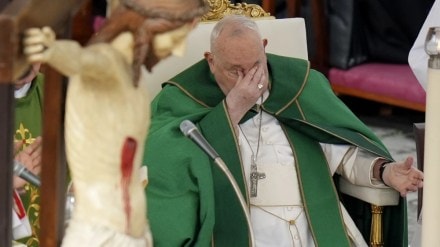More than two dozen Christian and Jewish groups, representing millions of Americans—including the Episcopal Church, the Union for Reform Judaism, the Mennonites, and the Unitarian Universalists—filed a federal lawsuit on Tuesday challenging a Trump administration policy that expands immigration agents’ authority to make arrests at houses of worship.
Lawsuit claims policy violates religious freedom
Filed in the US District Court in Washington, the lawsuit argues that the new policy instills fear of immigration raids, discouraging attendance at worship services and church-run community programs. The plaintiffs claim this violates their religious freedom, as it hampers their ability to minister to migrants, including those in the country without legal status.
“We have immigrants, refugees, people who are documented and undocumented,” said the Most Rev. Sean Rowe, presiding bishop of the Episcopal Church. “We cannot worship freely if some of us are living in fear.” Rowe emphasised that by joining the lawsuit, the churches seek to uphold their right to gather and practice their faith fully, following Jesus’ command to love their neighbors.
Legal precedents and previous lawsuits
The new case builds upon a lawsuit filed on January 27 by five Quaker congregations, which was later joined by the Cooperative Baptist Fellowship and a Sikh temple. That case, currently pending in the U.S. District Court in Maryland, argues that the policy change unlawfully erodes protections for houses of worship.
The Trump administration has yet to respond to the new lawsuit, which names the Department of Homeland Security and its immigration enforcement agencies as defendants. However, a Department of Justice memorandum filed Friday in response to the Quaker lawsuit outlines potential arguments. The DOJ contends that the plaintiffs’ claims are speculative and do not warrant blocking the new enforcement policy. The memo also argues that immigration enforcement at places of worship has long been permitted and that the recent policy shift merely allows field agents to conduct operations without requiring prior approval from a supervisor.
Broad impact of the lawsuit
The DOJ’s position that any injunction should be limited to the named plaintiffs may not hold as strongly against the latest lawsuit, given its broader scope. The plaintiffs in the new case represent a significant portion of American worshippers, including over 1 million followers of Reform Judaism, 1.5 million Episcopalians, 1.1 million members of the Presbyterian Church (U.S.A.), and 1.5 million members of the African Methodist Episcopal Church. Other plaintiffs include the Christian Church (Disciples of Christ), the Church of the Brethren, the Convención Bautista Hispana de Texas, the Friends General Conference, the Mennonite Church USA, the Unitarian Universalist Association, the United Synagogue of Conservative Judaism, and regional branches of the United Methodist Church and the United Church of Christ.
Lead counsel and legal arguments
Kelsi Corkran, lead counsel for the lawsuit from Georgetown University Law Center’s Institute for Constitutional Advocacy and Protection, believes the sheer scale of the case will make it difficult to ignore. She noted that before the policy change, immigration agents generally needed judicial warrants or special authorization to operate at places of worship, schools, and hospitals. Now, she argues, agents have broad discretion to act anywhere, anytime, putting undocumented individuals at greater risk.
One example cited in the lawsuit describes a Honduran man arrested outside his family’s Atlanta-area church while a service was taking place inside. Several religious organizations involved in the lawsuit also highlight how the policy threatens their community outreach efforts. Many churches and synagogues provide food banks, homeless shelters, and other support services for undocumented individuals who may now be too afraid to participate.
Fear among latino communities
The Latino Christian National Network, another plaintiff, seeks to unite Latino faith leaders in addressing pressing social issues. Its president, the Rev. Carlos Malavé, described the growing anxiety within his community: “People fear going to the store, they are avoiding going to church. Churches are increasingly shifting to online services because congregants fear for their families’ safety.”
Notably, the U.S. Conference of Catholic Bishops, the nation’s largest religious organization, has not joined the lawsuit but has criticized Trump’s immigration crackdown. On Tuesday, Pope Francis denounced the deportation plan, arguing that forcibly removing individuals solely based on their legal status strips them of their dignity and “will end badly.”
Conservative leaders support the policy
Conservative faith leaders and legal experts, however, support the new policy. Mat Staver, founder of the Christian legal organization Liberty Counsel, argues that places of worship should not serve as sanctuaries for those violating immigration laws. “Fugitives or criminals are not immune from the law simply because they enter a place of worship,” he stated. “This is not a matter of religious freedom.”
Boston College professor Cathleen Kaveny, an expert in theology and law, questioned whether the lawsuit’s religious freedom argument would hold up in court but warned that disregarding traditional sanctuary norms might be a strategic misstep for the administration. “Houses of worship have historically been seen as places of refuge,” she noted. “In many ways, they are like embassies—belonging to an eternal country.”
With inputs from AP
